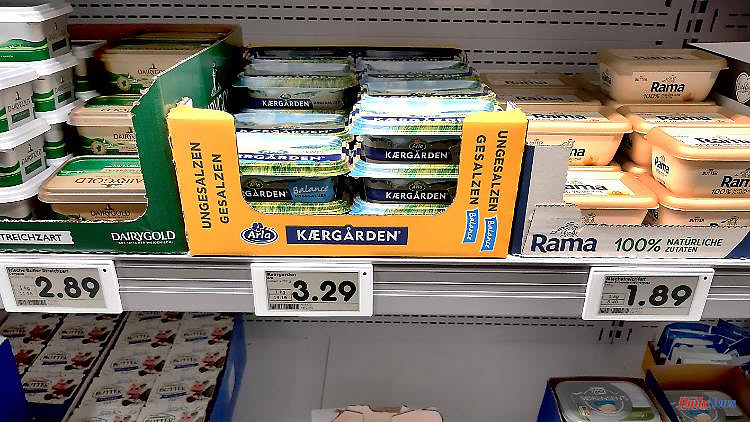Germany has the largest dairies in Europe. 80 percent of them run on gas. Heuser, head of the association, fears that the Federal Network Agency could shut down operations if gas supplies were stopped from Russia. He warns of the consequences - for the farmers and all consumers.
Inflation rolls. Not only gas and oil, but also groceries are slowly driving consumers to despair. Only recently did the price for branded butter from Kerrygold, Meggle or Weihenstephan break the three euro mark. The discounters are also turning the price screw on their own brands - more than two euros are now due at the checkout for half a pound of butter. At the beginning of the year, the price was still significantly lower. Will butter become a luxury good? In fact, things could get worse.
Responsible for the price explosion, says CEO Eckhart Heuser from the Dairy Industry Association in an interview with ntv.de, are record high price increases for raw milk, which dairies buy from farmers. "In the first week of this year, the price for a liter with 3.7 percent fat on the spot market was just 28 cents, now we're at 62 cents. That's more than doubled over the course of the year, and the trend is rising." heuser. On a spot market, milk is traded between dairies directly or through a trader. It is also known as the "here and now market". Delivery, acceptance and payment will be processed within two days at the current price.
From animal feed to fertilizer to fuel, everything has become more expensive during the gas and Ukraine crises. Added to this is the dry summer and the structural change in agriculture, says Heuser. Many farms have given up in recent years when milk prices have been low. The supply of raw milk has therefore become scarce. The result of the mixed situation: Prices have exploded. "These are price increases that I haven't seen in 30 years," says the expert. If it weren't for the uncertainty about how the gas supply would continue, it could have been the end of the price spiral. "But we don't know what else will happen, what Putin intends to do with us."
Dairy farming is one of the energy-intensive industries. "We get warm milk from the udder, cool it down to four or eight degrees at the farmer's, drive the cool milk to the dairy. There it is separated, then it is heated again, then processed, then cooled again and then cooled before it goes into the dairy shelf in retail," says Heuser, describing the production process. "That means we go through many temperature zones, and that means we have a relatively high use of energy in the German dairy industry."
If Putin doesn't turn on the tap again after servicing the Nord Stream 1 turbine, it could "be worth taking a closer look for the Federal Network Agency, but it would have dramatic consequences for the population's supply".
"The largest dairies in Europe are in Germany. Large companies have a connected load of more than ten megawatts. This means that if I shut down a dairy, I can use it to stabilize the grid very quickly," says Heuser. In this case, the dairies would face "enormous problems".
On June 23, the Federal Ministry of Economics and Climate Protection (BMWK) declared the gas emergency plan to be on alert. The plan has three escalation levels - the early warning level, the alert level and the emergency level. Netzagentur boss Klaus Müller justified the second level of escalation with concerns about a total failure of Russian gas supplies. The question is whether the upcoming regular maintenance of the Nord Stream 1 gas pipeline "will become a longer-lasting political maintenance," said Müller. Should stage three be announced, the Federal Network Agency regulates who is supplied with gas. The law stipulates: Consumers and the systemically important infrastructure are particularly protected, the first thing to do would probably be to save on companies.
A total of 80 percent of dairies in Germany work with gas. They have so-called combined heat and power plants, which also generate electricity. This is how it has been propagated and subsidized by politicians in recent years, says Heuser. "Unfortunately, we are not a protected customer within the meaning of the Energy Act, but only a systemically important customer. This means that the Federal Network Agency reserves the right to switch off depending on the situation in a particular area."
So soon the price could no longer be the decisive question, but: Who can still supply drinking milk, baby food, cheese and butter? Consumers could be faced with empty shelves. And the future prospects are bleak for dairy farmers too. If the dairies shut down, they would have to spill the milk. "The milk then goes into the liquid manure pit or is plowed under," says Heuser.
Mueller understood that. Nevertheless, the dairy industry has not received any guarantee that it will be supplied with gas as a priority. "We warn, we appeal: 'Take a close look. Don't save the wrong people!'" warns the head of the association. The problem: Regardless of whether it is a weapon or glass manufacturer, every branch of industry currently feels systemically important. The decision is difficult. It is unclear which shutdown order the agency will use at the end.
The regional importance is also decisive, says Heuser. In fact, the German gas network consists of umpteen sub-networks, in each sub-network there are different pressure conditions and therefore a different situation. According to Hauser, for a large dairy that happens to be in an area where ten health clinics with 5,000 beds are next door, that could mean that it was "unlucky. Then the health clinics get the gas, but the dairy doesn't."












